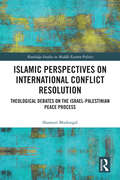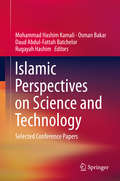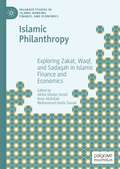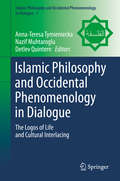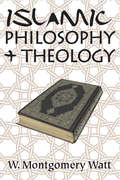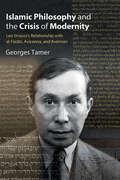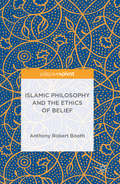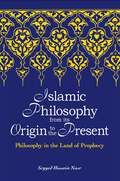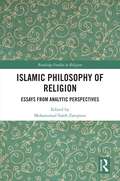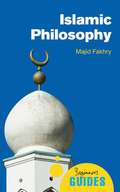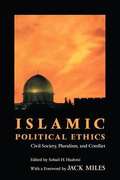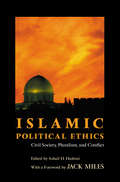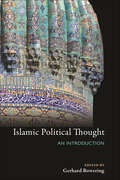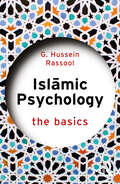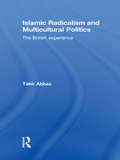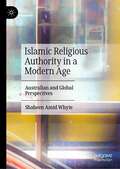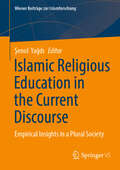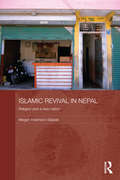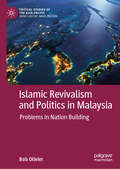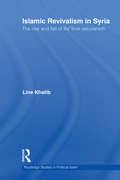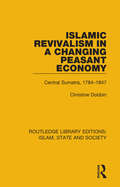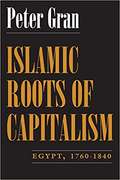- Table View
- List View
Islamic Perspectives on International Conflict Resolution: Theological Debates and the Israel-Palestinian Peace Process (Routledge Studies in Middle Eastern Politics)
by Shameer ModongalUpturning the traditional view of religion as a source of conflict, this book studies Islamic perspectives of international conflict resolution, re-interpreting the possibility of Israel-Palestine reconciliation beyond traditional secular frameworks. Beginning with an analysis of both classical and modern Islamic texts, the book provides a theoretical overview of Islamic conflict resolution before exploring the Israel-Palestine conflict in its historical, social and political dimensions. This framework allows for a real-world examination of Islamic conflict resolution in the context of Israel-Palestine theological debates. The author also critically assesses differing ideological and political views among Islamic scholars, divided by those supporting and those opposing a peace treaty between Israel and Palestine. Ultimately, it is argued that neglecting religion misses the opportunity to inject the spiritual dimension needed for reconciling the Israelis and Palestinians. The book’s multi-disciplinary approach will be of interest to a range of academics and policymakers, including those involved in International Relations and Islamic Studies. However, its accessible prose and engaging content will also appeal to undergraduates and general readers interested in Middle Eastern politics.
Islamic Perspectives on Science and Technology
by Mohammad Hashim Kamali Osman Bakar Daud Abdul-Fattah Batchelor Rugayah HashimThis book presents 25 selected papers from the International Conference on "Developing Synergies between Islam & Science and Technology for Mankind's Benefit" held at the International Institute for Advanced Islamic Studies Malaysia, Kuala Lumpur, in October 2014. The papers cover a broad range of issues reflecting the main conference themes: Cosmology and the Universe, Philosophy of Science and the Emergence of Biological Systems, Principles and Applications of Tawhidic Science, Medical Applications of Tawhidic Science and Bioethics, and the History and Teaching of Science from an Islamic Perspective. Highlighting the relationships between the Islamic religious worldview and the physical sciences, the book challenges secularist paradigms on the study of Science and Technology. Integrating metaphysical perspectives of Science, topics include Islamic approaches to S&T such as an Islamic epistemology of the philosophy of science, a new quantum theory, environmental care, avoiding wasteful consumption using Islamic teachings, and emotional-blasting psychological therapy. Eminent contributing scholars include Osman Bakar, Mohammad Hashim Kamali, Mehdi Golshani, Mohd. Kamal Hassan, Adi Setia and Malik Badri. The book is essential reading for a broad group of academics and practitioners, from Islamic scholars and social scientists to (physical) scientists and engineers.
Islamic Philanthropy: Exploring Zakat, Waqf, and Sadaqah in Islamic Finance and Economics (Palgrave Studies in Islamic Banking, Finance, and Economics)
by Abdul Ghafar Ismail Rose Abdullah Muhammad Hasbi ZaenalIn Islam, philanthropy is a spectrum of activity, and these activities differ in their purpose and in the principles on which they operate. To fully understand philanthropy, it is vital to examine not only its purpose but its motive and outcomes. This book identifies three types of philanthropy within this spectrum: Philanthropy as relief (zakat), which seeks to alleviate human suffering; philanthropy as an improvement (waqf), which seeks to maximize individual human potential and is energized by a principle that seeks to progress individuals and their society; and philanthropy as reform (sadaqah), which seeks to solve social problems. Philanthropy as civic engagement seeks to build better community structures and services and is directed by civic responsibility. This book explores philanthropy in Islam that covers the three primary spectra of activity: zakat, waqf, and sadaqah. Combining contributions from the Conference on Philanthropy for Humanitarian Aid under the joint organization of Sultan Sharif Ali Islamic University and the International Research Centre of Islamic Economics and Finance, International Islamic University College in collaboration with the Islamic Research and Training Institute, this book will be of interest to students, policymakers, practitioners, and researchers in the areas of Islamic finance and Islamic economics.
Islamic Philosophy and Occidental Phenomenology in Dialogue
by Anna-Teresa Tymieniecka Nazif Muhtaroglu Detlev QuinternThe contributions, composed in this volume, are inspired not only by the necessity but also by the potentialities of a process which continues and deepens cross-cultural understanding, especially between Islamic and Western philosophy. Following the tradition of an East-Western symphony of thoughts, the authors focus on common horizons and while applying comparative and historical approaches, varieties of unity appear on the ways towards a New Enlightenment. The creative force, orchestrating the harmony in the web of Life, communicates in the mean time with the capacities of human beings, advancing in deciphering its micro-macrocosmic dimensions. Here, the encounter of the Logos of Life Philosophy (A-T. Tymieniecka) and Islamic Philosophy open the space for constructive disputation. In the wake of the crisis of postmodern unknowability, paths towards a new critique of reason go hand in hand with fundamental issues, being reflected newly.
Islamic Philosophy and Theology: An Extended Survey (The\new Edinburgh Islamic Surveys Ser.)
by W. Montgomery WattEvents are making clear to ever-widening circles of readers the need for something more than a superficial knowledge of non-European cultures. In particular, the blossoming into independence of numerous African states, many of which are largely Muslim or have a Muslim head of state, has made clear the growing political importance of the Islamic world, and, as a result, the desirability of extending and deepening the understanding and appreciation of this great segment of mankind. Islamic philosophy and theology are looked at together in a chronological framework in this volume. From a modern standpoint, this juxtaposition of the two disciplines is important for the understanding of both; but it should be realized at the outset that it is a reversal of the traditional Islamic procedure. Not merely were the disciplines different, but in the earlier centuries the exponents were two different sets of persons, trained in two different educational traditions, each with its own separate institutions. There was little personal contact between philosophers and theologians, and the influence of the two disciplines on one another was largely by way of polemics. Eventually while philosophy died out as a separate discipline in the Islamic world, many parts of it were incorporated in theology. This work is designed to give the educated reader something more than can be found in the usual popular books. The work undertakes to survey a special part of the field, and to show the present stage of scholarship. Where there is a clear picture this will be given; but where there are gaps, obscurities and differences of opinion, these will also be indicated. This work is brilliant in its design, style, and intimate understanding. It is a must read for specialists and policy makers alike.
Islamic Philosophy and the Crisis of Modernity: Leo Strauss's Relationship with al-Fārābī, Avicenna, and Averroes (SUNY series in the Thought and Legacy of Leo Strauss)
by Georges TamerThis study examines the impact of the medieval Muslim philosophers al-Fārābī, Ibn Sīnā (Avicenna) and Ibn Rushd (Averroes) on Leo Strauss. Through meticulous source analysis, Georges Tamer critically evaluates Strauss's interpretation of their works. Furthermore, he explores how Islamic philosophy shaped Strauss's understanding of Maimonides and Plato, providing a compelling solution to the modernity crisis he identified. Offering fresh perspectives on the evolution of Strauss's thought and his distinctive approach to Arabic sources, Tamer sheds light on the pivotal role of al-Fārābī, the most significant Muslim philosopher in Strauss's view, including key aspects of al-Fārābī's political philosophy and his nuanced take on Plato's ideas. Islamic Philosophy and the Crisis of Modernity is a valuable addition to current scholarship on Strauss. Both philosophically erudite and philologically rigorous, Tamer presents the reader with a balanced perspective on Strauss's insights without being overly reverential or dismissive.
Islamic Philosophy and the Ethics of Belief
by Anthony Robert BoothIn this bookthe author argues that the Falasifa,the Philosophers of the Islamic Golden Age, are usefully interpreted throughthe prism of the contemporary, western ethics of belief. He contends that theirposition amounts to what he calls 'Moderate Evidentialism' - that only for theepistemic elite what one ought to believe is determined by one's evidence. Theauthor makes the case that the Falasifa's position is well argued, ingeniouslycircumvents issues in the epistemology of testimony, and is well worth takingseriously in the contemporary debate. He reasons that this is especially thecase since the position has salutary consequences for how to respond tothe sceptic, and for how we are to conceive of extremist belief.
Islamic Philosophy from Its Origin to the Present: Philosophy in the Land of Prophecy (SUNY series in Islam)
by Seyyed Hossein NasrAIslamic Philosophy from Its Origin to the Present offers a comprehensive overview of Islamic philosophy from the ninth century to the present day. As Seyyed Hossein Nasr attests, within this tradition, philosophizing is done in a world in which prophecy is the central reality of life—a reality related not only to the realms of action and ethics but also to the realm of knowledge. Comparisons with Jewish and Christian philosophies highlight the relation between reason and revelation, that is, philosophy and religion.Nasr presents Islamic philosophy in relation to the Islamic tradition as a whole, but always treats this philosophy as philosophy, not simply as intellectual history. In addition to chapters dealing with the general historical development of Islamic philosophy, several chapters are devoted to later and mostly unknown philosophers. The work also pays particular attention to the Persian tradition.Nasr stresses that the Islamic tradition is a living tradition with significance for the contemporary Islamic world and its relationship with the West. In providing this seminal introduction to a tradition little-understood in the West, Nasr also shows readers that Islamic philosophy has much to offer the contemporary world as a whole.
Islamic Philosophy of Religion: Essays from Analytic Perspectives (Routledge Studies in Religion)
by Mohammad Saleh ZarepourThis volume focuses on Islamic philosophy of religion with a range of contributions from analytic perspectives. It opens with methodological discussions on the relationship between the history of Islamic philosophy and contemporary analytic philosophy. The book then offers a philosophical examination of some specific Islamic beliefs as well as some approaches to general beliefs that Islam shares with other religions. The chapters address a variety of topics from the existence and attributes of God through to debates on science and religion. The authors are predominantly scholars from Muslim backgrounds who tackle philosophical issues concerning Islam as their own living religion, representing internal perspectives that have never been vocal in analytic philosophy of religion so far. This is valuable reading for scholars and students of philosophy, theology, and religious studies.
Islamic Philosophy: A Beginner's Guide (Beginner's Guides #8)
by Majid FakhryFrom the introduction of Greek Philosophy into the Muslim world in the eighth century, right through to modern times, Majid Fakhry charts the evolution and interaction of philosophy, theology, and mysticism in the Islamic context. Highlighting key individuals, movements, concepts and writings, Fakhry also explores the conflicts and controversies between anti- and pro-philosophical parties that have characterised the development of Islamic thought. Majid Fakhry is Emeritus Professor of Philosophy at the Center for Muslim-Christian Understanding, Georgetown University, Washington DC.
Islamic Political Ethics
by Sohail H. HashmiOne of the most dynamic aspects of the Islamic revival during the past two centuries has been the rethinking of Islamic political thought. A broad range of actors, ideas, and ideologies characterize the debate on how Islamic ethics and law should be manifested in modern institutions. Yet this aspect of the "return to Islam" has been neglected by policymakers, the media, and even many scholars, who equate "political Islam" with merely one strand, labeled "Islamic fundamentalism." Bringing together ten essays from six volumes of the Ethikon Series in Comparative Ethics, this book gives a rounded treatment to the subject of Islamic political ethics. The authors explore the Islamic ethics of civil society, boundaries, pluralism, and war and peace. They consider questions of diversity, discussing, among other subjects, Islamic regimes' policies regarding women and religious minorities. The chapters on war and peace take up such crucial and timely issues as the Islamic ethics of jihad, examining both the legitimate conditions for the declaration of war and the proper conduct of war. In their discussions, the contributors analyze the works of classical writers as well as the full range of modern reinterpretations. But beyond these analyses of previous and contemporary thinkers, the essays also reach back to the two fundamental sources of Islamic ethics--the Qur'an and traditions of the Prophet--to develop fresh insights into how Islam and Muslims can contribute to human society in the twenty-first century.
Islamic Political Ethics: Civil Society, Pluralism, and Conflict (Ethikon Series in Comparative Ethics)
by Sohail H. HashmiOne of the most dynamic aspects of the Islamic revival during the past two centuries has been the rethinking of Islamic political thought. A broad range of actors, ideas, and ideologies characterize the debate on how Islamic ethics and law should be manifested in modern institutions. Yet this aspect of the "return to Islam" has been neglected by policymakers, the media, and even many scholars, who equate "political Islam" with merely one strand, labeled "Islamic fundamentalism." Bringing together ten essays from six volumes of the Ethikon Series in Comparative Ethics, this book gives a rounded treatment to the subject of Islamic political ethics.The authors explore the Islamic ethics of civil society, boundaries, pluralism, and war and peace. They consider questions of diversity, discussing, among other subjects, Islamic regimes' policies regarding women and religious minorities. The chapters on war and peace take up such crucial and timely issues as the Islamic ethics of jihad, examining both the legitimate conditions for the declaration of war and the proper conduct of war.In their discussions, the contributors analyze the works of classical writers as well as the full range of modern reinterpretations. But beyond these analyses of previous and contemporary thinkers, the essays also reach back to the two fundamental sources of Islamic ethics--the Qur'an and traditions of the Prophet--to develop fresh insights into how Islam and Muslims can contribute to human society in the twenty-first century.The authors are Dale F. Eickelman, Hasan Hanafi, Sohail H. Hashmi, Farhad Kazemi, John Kelsay, Muhammad Khalid Masud, Sulayman Nyang, Bassam Tibi, and M. Raquibuz Zaman.From the foreword by Jack Miles:"Western foreign ministers and secretaries of state may have to learn a little theology if the looming clash between embattled elements both in the West and in the Muslim umma is to yield to disengagement and peaceful coexistence, to say nothing of fruitful collaboration. . . . It is, then, no idle academic exercise that the thinkers whose work is collected here have in hand. The long-term practical importance of their work can scarcely be overstated."
Islamic Political Thought: An Introduction
by Gerhard BoweringA concise and authoritative introduction to Islamic political ideasIn sixteen concise chapters on key topics, this book provides a rich, authoritative, and up-to-date introduction to Islamic political thought from the birth of Islam to today, presenting essential background and context for understanding contemporary politics in the Islamic world and beyond. Selected from the acclaimed Princeton Encyclopedia of Islamic Political Thought, and focusing on the origins, development, and contemporary importance of Islamic political ideas and related subjects, each chapter offers a sophisticated yet accessible introduction to its topic. Written by leading specialists and incorporating the latest scholarship, the alphabetically arranged chapters cover the topics of authority, the caliphate, fundamentalism, government, jihad, knowledge, minorities, modernity, Muhammad, pluralism and tolerance, the Qur'an, revival and reform, shari?a (sacred law), traditional political thought, ‘ulama' (religious scholars), and women. Read separately or together, these chapters provide an indispensable resource for students, journalists, policymakers, and anyone else seeking an informed perspective on the complex intersection of Islam and politics.The contributors are Gerhard Bowering, Ayesha S. Chaudhry, Patricia Crone, Roxanne Euben, Yohanan Friedmann, Paul L. Heck, Roy Jackson, Wadad Kadi, John Kelsay, Gudrun Krämer, Ebrahim Moosa, Armando Salvatore, Aram A. Shahin, Emad El-Din Shahin, Devin J. Stewart, SherAli Tareen, and Muhammad Qasim Zaman.A new afterword discusses the essays in relation to contemporary political developments.
Islamic Politics, Muslim States, and Counterterrorism Tensions
by Peter HenneThe US Global War on Terror and earlier US counterterrorism efforts prompted a variety of responses from Muslim states despite widespread Islamic opposition. Some cooperated extensively, some balked at US policy priorities, and others vacillated between these extremes. This book explains how differing religion-state relationships, regimes' political calculations, and Islamic politics combined to produce patterns of tensions and cooperation between the United States and Muslim states over counterterrorism, using rigorous quantitative analysis and case studies of Pakistan, the United Arab Emirates, and Turkey. The book combines recent advances in the study of political institutions with work on religion and politics to advance a novel theory of religion and international relations that will be of value to anyone studying religion, terrorism, or Islamic politics. It also provides numerous insights into current events in the Middle East by extending its analysis to the Arab Spring and the rise of the Islamic State.
Islamic Populism in Indonesia and the Middle East
by Vedi R. HadizIn a novel approach to the field of Islamic politics, this provocative new study compares the evolution of Islamic populism in Indonesia, the country with the largest Muslim population in the world, to the Middle East. Utilising approaches from historical sociology and political economy, Vedi R. Hadiz argues that competing strands of Islamic politics can be understood as the product of contemporary struggles over power, material resources and the result of conflict across a variety of social and historical contexts. Drawing from detailed case studies across the Middle East and Southeast Asia, the book engages with broader theoretical questions about political change in the context of socio-economic transformations and presents an innovative, comparative framework to shed new light on the diverse trajectories of Islamic politics in the modern world.
Islamic Psychology: The Basics (The Basics)
by G. Hussein RassoolIslamic Psychology: The Basics is a jargon-free and accessible introduction that explores psychology from an Islāmic perspective, and provides a foundation level overview of the fundamental principles and practices of Islāmic psychology. The book introduces concepts, models, approaches, themes, and theories you need to know to study the mind, soul, and behaviour based on Islāmic scripture. Offering an overview of Islāmic psychology and what Islāmic psychologists do, chapters address key topics including the history of the evolution of the science of the soul, and the psychology of human behaviour and experiences. Rassool examines the concepts of the Fitrah, the Nafs (Self), the Aql (Intellect), the Rūḥ (Soul) the Qalb (Heart), and the concept of Islāmic healing and spiritual interventions. Other themes include the Qur’an and psychology, models and approaches in Islāmic psychology, interpreting Islāmic psychology for modern times, and the contemporary scope of the practice of Islāmic psychology. Outlining the challenges and solutions of the development of Islāmic psychology and potential future trends, and including features to aid learning, this is the ideal introductory book for students in Psychology, Islāmic Psychology, and Islāmic Studies, as well as professionals including counsellors and therapists, and anyone interested in psychology from an Islāmic perspective.
Islamic Radicalism and Multicultural Politics: The British Experience
by Tahir AbbasThe expression of an Islamic political radicalism in Britain has been one of the most dramatic developments in recent decades. Islamic Radicalism and Multicultural Politics explores the nature of this phenomenon by analysing the origins of Islam and its historical contact with Western Europe and Britain, and the emergence of Islamic political radicalism in the Muslim world and in the West. Tahir Abbas draws on historical analysis and contemporary case studies to explore the post-war immigration and integration of Muslim groups, the complex relations that exist between a secular liberal Britain and a diverse but multifaceted Islam, and the extent of social and economic inequalities that affect Muslims as individual citizens and in local area communities. He shows how violent extremism among British Muslims is in reality influenced by a range of issues, including the factors of globalisation and contemporary politics, media and culture. Analysing and dissecting public policy, Abbas offers suggestions for tackling the major social, political and economic questions facing British Muslims in the post-7/7 era. An important contribution to the study of religion, ‘race’ and ethnicity in modern Britain, this accessible work will be of interest to anyone working in the field of Islamic studies, sociology and political radicalism. Cover design by Mahtab Hussain, www.mahtabhussain.com
Islamic Reform in South Asia
by Filippo Osella Caroline OsellaThe articles in this volume build up ethnographic analysis complementary to the historiography of South Asian Islam, which has explored the emergence of reformism in the context of specific political and religious circumstances of nineteenth-century British India. Taking up diverse popular and scholarly debates as well as everyday religious practices, this volume also breaks away from the dominant trend of mainstream ethnographic work, which celebrates Sufi-inspired forms of Islam as tolerant, plural, authentic and so on, pitted against a 'reformist' Islam. Urging a more nuanced examination of all forms of reformism and their reception in practice, the contributions here powerfully demonstrate the historical and geographical specificities of reform projects. In doing so, they challenge prevailing perspectives in which substantially different traditions of reform are lumped together into one reified category (often carelessly shorthanded as 'wah'habism') and branded as extremist – if not altogether demonised as terrorist.
Islamic Religious Authority in a Modern Age: Australian and Global Perspectives
by Shaheen Amid WhyteThis book situates Australian Muslim experiences of religious authority within the global context of Islam in the modern world. While drawing on examples of Muslim-majority states, new empirical findings indicate the growing diversity of Muslim religious actors in Australia, as well as the contextual realities shaping the way religious authority is legitimised and contested in democratic and authoritarian environments. In particular, the study challenges homogenous articulations of Islamic religious authority in unearthing new voices, epistemologies and socio-political factors shaping Muslim attitudes and experiences of religious authority. The book fills important gaps in the field, such as intra-Muslim relations, female religious authority, digital Islam and the relationship between traditional ulama, reformists and Muslim intellectuals in the West.
Islamic Religious Education in the Current Discourse: Empirical Insights in a Plural Society (Wiener Beiträge zur Islamforschung)
by Şenol YağdıThe volume presents the most current empirical research in the field of Islamic religious education. Its findings are an important contribution to the development of theory in Islamic religious education. The contributions address the challenges of Islamic religious education and professionalization research of Islamic religious education teachers and in a plural society.
Islamic Revival in Nepal: Religion and a New Nation (Routledge Contemporary South Asia Series)
by Megan Adamson SijapatiThis book draws on extensive fieldwork among Muslims in Nepal to examine the local and global factors that shape contemporary Muslim identity and the emerging Islamic revival movement based in the Kathmandu valley. Nepal's Muslims are active participants in the larger global movement of Sunni revival as well as in Nepal's own local politics of representation. The book traces how these two worlds are lived and brought together in the context of Nepal's transition to secularism, and explores Muslim struggles for self-definition and belonging against a backdrop of historical marginalization and an unprecedented episode of anti-Muslim violence in 2004. Through the voices and experiences of Muslims themselves, the book examines Nepal’s most influential Islamic organizations for what they reveal about contemporary movements of revival among religious minorities on the margins--both geographic and social--of the so-called Islamic world. It reveals that Islamic revival is both a complex response to the challenges faced by modern minority communities in this historically Hindu kingdom and a movement to cultivate new modes of thought and piety among Nepal’s Muslims.
Islamic Revivalism and Politics in Malaysia: Problems in Nation Building (Critical Studies of the Asia-Pacific)
by Bob OlivierThis book describes the Islamisation process that has unfolded in Malaysia over the last fifty years and provides feedback from in-depth interviews with 100 individuals from Malaysia’s “educated classes”, or the “elite”, regarding their reactions to the changes that have accompanied Islamisation and how they feel it has impacted them. It includes a brief overview of Islamisation globally and a brief history of Malaysia, focusing especially on those aspects relevant to the book’s subject. The book gives a comprehensive explanation of how and why Islamisation occurred in Malaysia and illustrates the extent of change that has accompanied it. The feedback from the research participants includes special analysis of reactions from Muslim women and non-Muslims. The reasons behind there being so little public debate about Islamisation and the concerns that this group of people have about what is happening is also explained. Finally, the author gives his opinion on the impact the change in government in May 2019 is likely to have.
Islamic Revivalism in Syria: The Rise and Fall of Ba'thist Secularism (Routledge Studies in Political Islam)
by Line KhatibContemporary studies on Syria assume that the country’s Ba’thist regime has been effective in subduing its Islamic opposition, placing Syria at odds with the Middle East’s larger trends of rising Islamic activism and the eclipse of secular ideologies as the primary source of political activism. Yet this assumption founders when confronted with the clear resurgence in Islamic militantism in the country since 2004. This book examines Syria’s current political reality as regards its Islamic movement, describing the country’s present day Islamic groups – particularly their social profile and ideology – and offering an explanation of their resurgence. The analysis focuses on: Who are today’s Syrian Islamic groups? Why and how are they re-emerging after 22 years of relative silence as an important socio-economic and political force? How is the Syrian state dealing with their re-emergence in light of Syria’s secularism and ideologically diverse society? Bridging area studies, Islamic studies, and political science, this book will be an important reference for those working within the fields of Comparative Politics, Political Economy, and Middle Eastern Studies.
Islamic Revivalism in a Changing Peasant Economy: Central Sumatra, 1784-1847 (Routledge Library Editions: Islam, State and Society)
by Christine DobbinThis title, first published in 1983, is a significant study of one of the many revivalist movements which flowered in numerous Islamic societies in the late eighteenth and early nineteenth centuries, and attempts to provide one particular assessment of the place of revivalism in the evolution of Islamic societies. The subject of this title is the Padri movement, and the community involved is that of the Minangkabau of Central Sumatra, one of the major communities inhabiting the Indonesian archipelago. In the process of considering the reconstruction of a society in the throes of an agricultural transformation, the historical development of the Indonesian village became the object of attention, encompassing the economic and social histories of individual villages. This title will be of interest to students of history and Islamic Studies.
Islamic Roots Of Capitalism: Egypt, 1760-1840 (Middle East Studies Beyond Dominant Paradigms)
by Peter GranThis paperback edition has an updated first chapter, resituating its main argument for today’s readers. New historical data on eighteenth- and nineteenth-century Egypt makes an extremely persuasive argument for the eighteenth-century roots of Egyptian modernity. The similarity, too, of Egyptian history with other Mediterranean countries is much more clearly demonstrated today than when Islamic Roots of Capitalism first was published.
